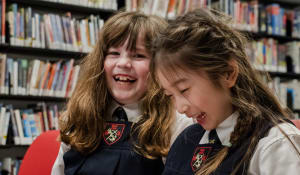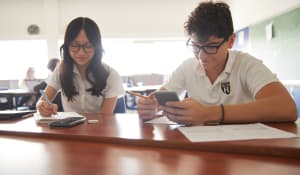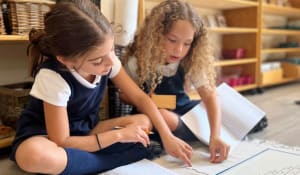Photograph by Jeff Vinnick
Students must struggle through academic and social challenges to learn the coping skills they'll need to survive in the world. If they don't learn these skills at home or in school, they'll have to pick them up at university or in the work world. American universities report that students' inability to cope with the minor bumps that are normal in life is beginning to interfere with schools' ability to deliver education.
At HTS, character and child development is an important part of the education we provide to our students. Through the academic program, through the students' social interaction, and through our mandatory co-curricular program, we give students the tools to grow into successful, independent adults.
To accomplish this important goal, our teachers and administrators focus on the following important elements:
1. Encourage voluntary reading
There is no more important habit for students to acquire than reading. Students who read voluntarily, read, write and think more effectively, perform better in all subjects, have better general knowledge – which contributes to better understanding of what they read and have more extensive vocabularies that are key to success on tests like the SATs and LSAT. In order to facilitate voluntarily reading, we suggest having a wide variety of materials available such as newspapers, magazines, and books. It makes no difference if the students don't have an appreciation for the classics; the important point is that they are reading.
2. Teach self-advocacy
Students need to learn to speak for themselves and to negotiate with their peers and with their teachers and other adults. There are few life skills more vital to adults than the ability to advocate for themselves and since it's a skill that can take years to master, it's important it is encouraged from a very young age. By jumping in and resolving conflicts for students, teachers and parents inadvertently communicate a message to their kids that they aren't competent to look after themselves, diminishing their confidence in speaking for themselves and solving problems.
3. Find the technological balance
Kids have to learn to use new technologies appropriately and safely, but it's also important they continue to read, go outside and interact with real people. Try to limit screen time and keep an eye on what students are doing online. The virtual world can become a very unhealthy place for young people who don't have the maturity to understand the impact of the communications method they are using or realize what is said in the cyber realm can spill into the real world with very serious consequences.
4. Be involved with school life beyond academics
Students who are involved in co-curricular programs at school perform better academically and demonstrate more positive attitudes about school and academics. They develop stronger relationships with people at school and maintain those relationships long after they graduate. So while it seems to make sense to go home right after class and get on with homework, the reality is that students will achieve higher levels of academic success and be happier if they're busier at school.
5. Make sure students take down time
The world is becoming a more competitive place and it seems crucial to squeeze as much purposeful activity into young peoples' lives as possible to ensure they'll be ready for the future, but this is counterintuitive. Students need unstructured or unscheduled time in which they can choose what they want to do, not only because they need a break, but because they need to learn how to manage themselves and make decisions independently.





















